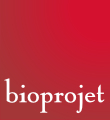This unit develops new research targets through cloning, assesses chemically synthesised molecules in vitro through multiple automated biological tests, verifies their selectivity, and develops adverse effect prediction systems, particularly in terms of cardiac safety tests.

Research Centre
Bioprojet, a multidisciplinary
Bioprojet Biotech, the Bioprojet research centre, employs around 45 scientists and technicians covering all preclinical research professions from original chemical molecule development to the stages prior to clinical development.
The innovation strategy aims at the discovery first-in-class drugs fulfilling unmet therapeutic needs. It is based on the rational development of molecules interacting with clearly identified targets, most of which belong to the class of GPCR receptors.
Continue reading
The drug candidates primarily belong to the realms of neurology and immunology.
The site has a surface area of over 10,000 m2 f which almost half is occupied by the laboratories. The latter are equipped with cutting-edge scientific equipment necessary for the realisation of highly diverse drug preclinical research and development operations.
The research centre
is made up of four scientific units:

Biochemistry/molecular biology unit
Therapeutic chemistry unit
This unit makes use of molecular modelling of target proteins to create new molecules through rational synthesis and assessment of activity and selectivity; the unit also prepares industrial synthesis pathways for candidate drugs approved for development.


Pharmacology unit
This unit assesses drugs on models predictive of therapeutic activities, prepares and directs regulatory safety toxicology and pharmacology studies, which are then carried out at specialist centres.
Pharmacokinetics/Bioanalysis unit
(GLP compliance level A), this unit assesses the pharmacokinetics, tissue distribution, metabolism, and possible interactions of candidate drugs at the preclinical stage, particularly following toxicology studies. Finally, it develops methods for and carries out the bioanalysis of clinical studies.



